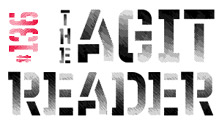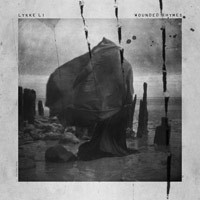
Wounded Rhymes
LL
The extended time allowed quirky Swedish chanteuse Lykke Li to progress out of relative indie obscurity and into the role of an internationally renowned siren akin to Björk may have been a bit too much. While her sophomore album, Wounded Rhymes, is geared to show off Lykke’s strengths—her classic coo, her crooked beats and her youthful innovations in pop—it soon becomes apparent that she may not be ready for the big time, and in most instances, that her ideas were left to over-incubate. Where her debut, Youth Novels, was lush, atmospheric and mature for such a newbie, the charm came in the spontaneity and energy of the songs. Regrettably Wounded Rhymes is devoid of that spark of discovery. The problem here is that it wastes too much space trying to identify Lykke as a unique individual voice among her pop peers, when in fact the previously explored identity crisis was her calling card.
On Wounded Rhymes, that identity crisis remains, but it’s a bleak, colorless and often flat survey of what made her so intriguing in the first place. “Get Some” is a tub-thumping sex-beat, empowering Lykke as your “prostitute,” but never really sleazing up the sparse, minimalist guitar flange that reverberates around the central rhythm. “I Know Places” is a wonderfully boring accent on her voice’s increasing range, but the existential hope and cabaret-like schlock of the canvas upon which she sings is bare and bone-dry with nothing memorable enough to elicit an emotion. Only on “I Follow Rivers” does this new shift have an impact, as it’s both danceable and mature, confident and infectious, showing her songwriting as unique as her off-the-record personality and stage presence. To call this a flop might be a stretch. It will certainly appeal to fans of Adele and Duffy (adult contemporary fluff with a put-on heart), but the underground that championed for her progression might be wary of her reluctance to experiment too much. There are qualities that still separate Lykke from the pack—the biting persona and quick wit of the searing “Rich Kids Blues” and the blatant sexualizing of her classically trained dancer past (see the videos)—but for the most part, the over-thinking of Lykke and her handlers has ruined what should have been a defining celebration.
Kevin J. Elliott
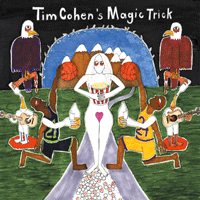
Magic Trick
Bad Blood ep
Captured Tracks
Loyal Agit readers no doubt know of our affection for the Fresh & Onlys and the plethora of records they’ve given us over the last few years. If that weren’t enough, singer and guitarist Tim Cohen has consistently released music on his own and is now up to his third full-length, Magic Trick, augmented by a simultaneously released eight-song EP, Bad Blood. To say Cohen doesn’t understand the concept of downtime seems to be an understatement.
Comparing these two records, one gets the sense that Cohen was deliberate in his division of the songs, with the esoteric material left for the full-length and the more immediate cuts placed on the EP. “Delicate Creatures,” which leads off Bad Blood, would have fit in seamlessly on the Fresh & Onlys’ Play It Strange and is only second amongst all the new songs to “I Am Never Going to Die,” the dappled pop song that starts Magic Trick. But whereas the LP moves onto the (no less brilliant) analog-synth throb of “New House in Heaven” and “Season of Fires,” as well as loopier tracks like “Sweetheart” and “Top on Tight,” Bad Blood stays to a straight path of pysch-tinged guitar-based pop, with songs like “Fight for the One That You Love” and “Pyramid Scheme” showing off this particular penchant of Cohen’s. Both modes produce plenty worth hearing, and these records leave one continuing to wonder at not only this guy’s prolificness, but his innate songwriting smarts.
Stephen Slaybaugh
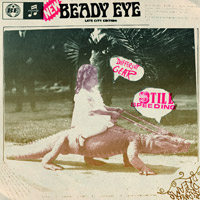
Different Gear, Still Speeding
Dangerbird
It was a total “huh, what?” moment in 2009 when Noel Gallagher announced that he was quitting Oasis, a move akin to if Bono decided to step down from U2 or Questlove decided to leave the Roots. But tellingly, the band never announced that they were breaking up. It just seemed to be the logical conclusion since Noel was the main creative source behind the band. Instead, the remaining members of the 1999–2009 edition—Liam Gallagher, Gem Archer (formerly of Heavy Stereo) and Andy Bell (formerly of Ride)—along with drummer Chris Sharrock, who joined Oasis right before Noel’s departure, decided to stay together and adopt the name Beady Eye. Almost two years later, they’ve released their debut album, Different Gear, Still Speeding.
There’s something kind of admirable about the band deciding to continue on, but dropping the Oasis name. After all ⅘ of Oasis are in Beady Eye and it was Liam who named the band before older brother Noel entered the picture. Historically speaking, the remonikered band plan doesn’t always work out. Anyone remember Talk Show? You have to give it up to them for walking away from the comfort of the familiar brand and trying something new. (Billy Corrigan may want to give that a try.)
But the biggest question surrounding Beady Eye was where the songs were going to come from. Luckily for Beady Eye the non-Gallagher members picked up the slack, as there are some songs here that are a strong as Oasis’ work. There are also some groaners. “Beatles and Stones” is barely B-Side worthy, yet it adds to the charm of the better songs.
And what does Beady Eye sound like? Well, to no one’s surprise they sound an awful lot like Oasis. However, there are some clear differences. There’s a looser, more garage rock feel on some of the tracks. There is more space on the songs and less of the guitar wall of sound, but the biggest change is in Liam’s voice. The nasal whine that he employed to great effect in the past has largely been tamed. There are a few times where he barely sounds like Liam Gallagher at all, and in general, Beady Eye comes off like a completely different group—or at least one refreshed. As a title, Different Gear, Still Speeding hits the nail squarely on the head.
Dorian S. Ham
MP3: “The Roller”

Lives and Treasure
Friendly Fire
For a Brooklyn band, the Acryclics sure do sound Middle American. Let’s see if we can string together some comparative heritage for their sound. Imagine a young girl growing up lonely in Missouri, the middle sister of Neko Case and Inara George, if that were possible. She spends her 1990s childhood pining over the under-appreciated masterpieces of Mr. Mister and the Cutting Crew. That’s our avatar for Molly Shea, one half of the band. The other half is Jason Klauber. It doesn’t seem like much of a stretch to imagine that Klauber spent plenty of time styling his hair to get that Midwestern emo look before discovering that it’s actually the Oberst pout that’s the key to nailing a sloppy vocal twang. Not that there’s anything wrong with that.
On the band’s new album, Lives and Treasure, the shiny sounds of “Counting Sheep,” “Molly’s Vertigo” and the title track could fit right into the 1987 MTV rotation, or, better yet, on the soundtrack to something like 9½ Weeks. (And yes, I’m getting sick of finding new ways to describe this year’s retro sound.) These tracks are highly arranged, and if the sonics are evocative of a certain moment in pop history, it’s either a very deliberate choice or a very ignorant one. Given the precision of the presentation and the band’s high level of commitment to aesthetic, let’s assume it’s the former.
Occasionally, though, the band veers into some lightweight folk, as on “The Window” and “It’s Cool Here.” While these tracks are no less pristine in sound, featuring flourishes of strings and some very deep bass notes, the songwriting is weaker and certainly doesn’t contribute much to what, based on the rest of the album, I thought the project was all about. At best, they’re distracting and worth skipping. At worst, they reveal the shallowness of the band’s pool of ideas. When the band sticks to its plan, though, the effect is certainly pleasant, which is to say, unoffensive.
Matt Slaybaugh
MP3: “Sparrow Song” (featuring Caroline Polachek)
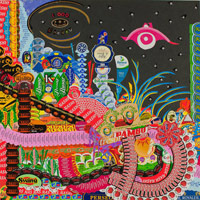
1,000
Kill Shaman
Those paying attention should remember French trio Cheveu’s self-titled debut from a few years ago. That record was a whirl of guitar fuzz of and a sundry of electronic noises with one foot in the shitgaze of the time and the other stepping toward something else entirely. There was something wonderfully disorienting and foreign about the record, and not just because of its creators’ nationality.
With 1,000, the band’s new full-length pressed in an edition of the title number, Cheveu steps further into the beyond for a record that completely eclipses its predecessor. From the opening “Quattro Stagioni,” whose buzzing riff is echoed by a chorus of strings, this record shows that it’s possible to elevate so-called “lo-fi” aesthetics to something truly grand. Indeed, on “No Birds,” those strings are juxtaposed with a cheap drum machine beat, as well as a bit of residual white noise, which, in truth, only bolsters the song’s ambiance. In a completely dissimilar, but no less rich manner, “Ice Ice Baby” is indeed a Vanilla Ice cover, but instead of sampling Queen, Cheveu sculpts sounds from their bevy of thrift store instruments and guitar noise into a form of dementia only vaguely resembling the original. “Push Push in the Bush Bush,” on the other hand, has nothing to do with the disco hit and is instead a wrapping of a warped narrative around minimalistic beats and a lean guitar line. Like, say, Fuck’s best work, the album constantly shifts and changes, ending with the robots-on-acid swan song of “Bon Nuit Cherie.” Cheveu may venture into the abyss on more than one occasion on 1,000, but by doing so, they also move closer to the Arcadian realm.
Stephen Slaybaugh
ALBUM REVIEWS
Toro y Moi, Underneath the Pine
Yuck, Yuck
Beans, End It All
PJ Harvey, Let England Shake
Bright Eyes, The People's Key
DeVotchKa, 100 Lovers
Chain & the Gang, Music's Not for Everyone
Win Win, Win Win
East River Pipe, We Live in Rented Rooms
Mogwai, Hardcore Will Never Die, But You Will
Cowboy Junkies, Demons
La Sera, La Sera and The Babies, The Babies
The Twilight Singers, Dynamite Steps
Dom, Sun Bronzed Greek Gods EP
